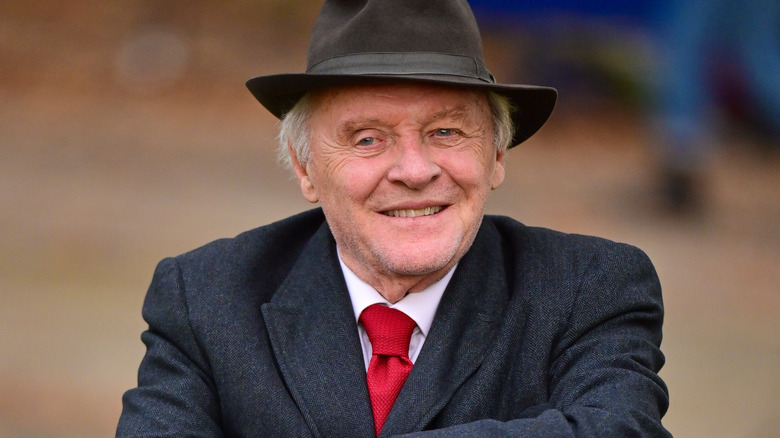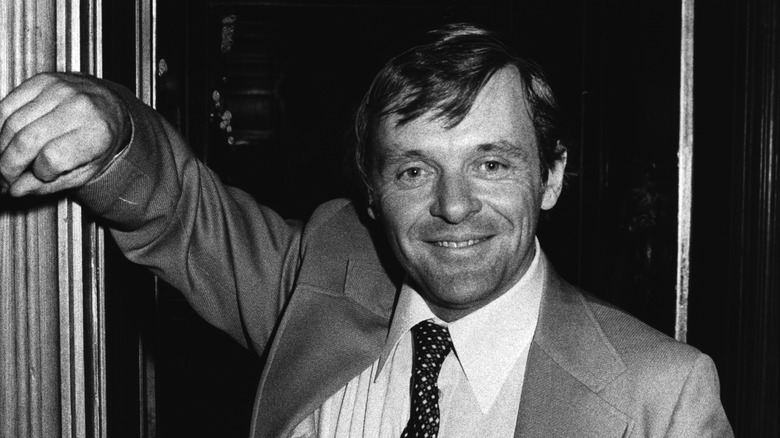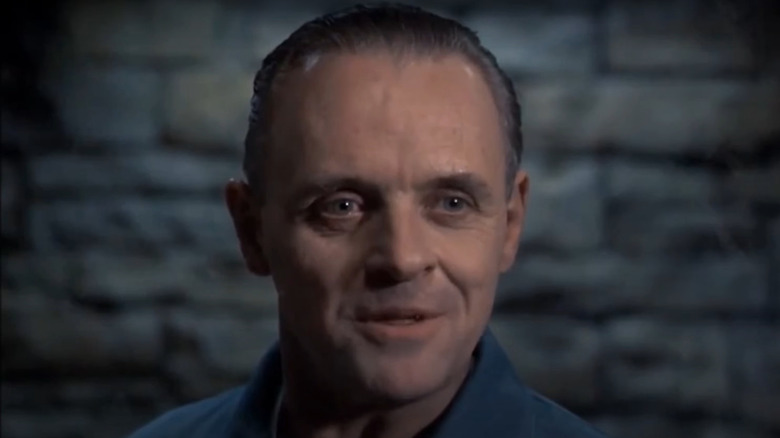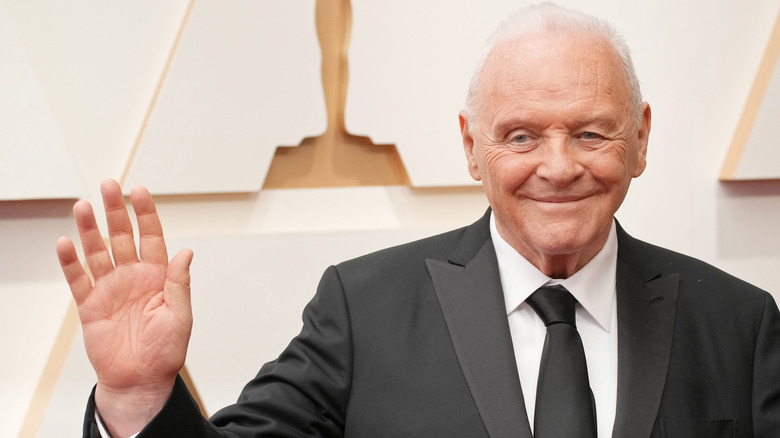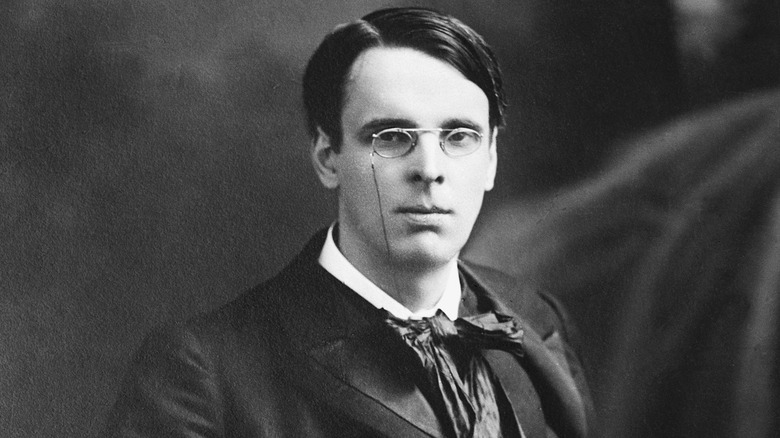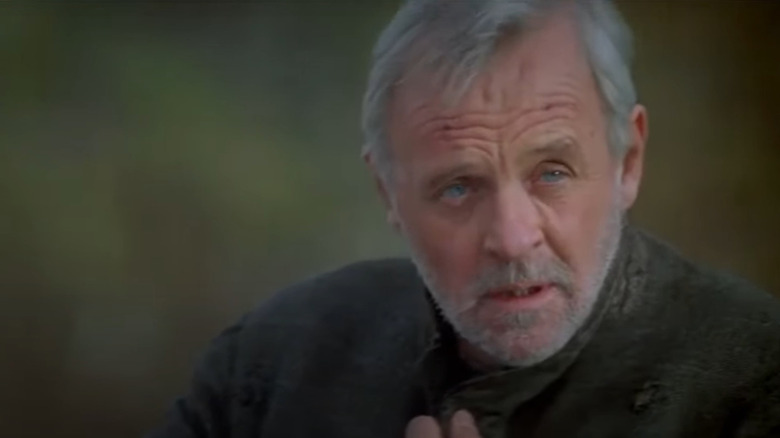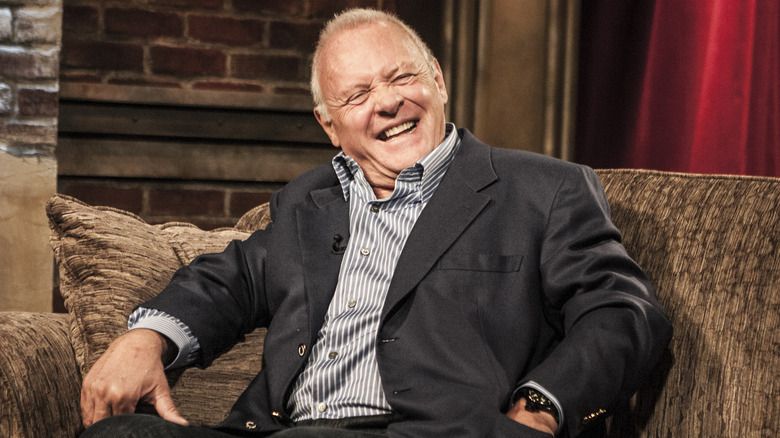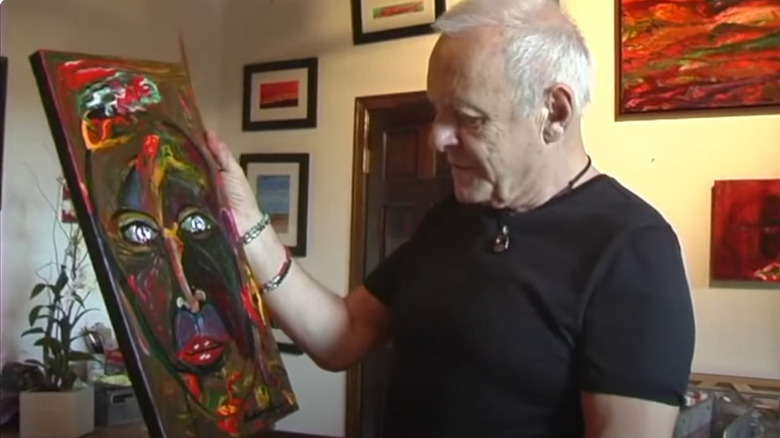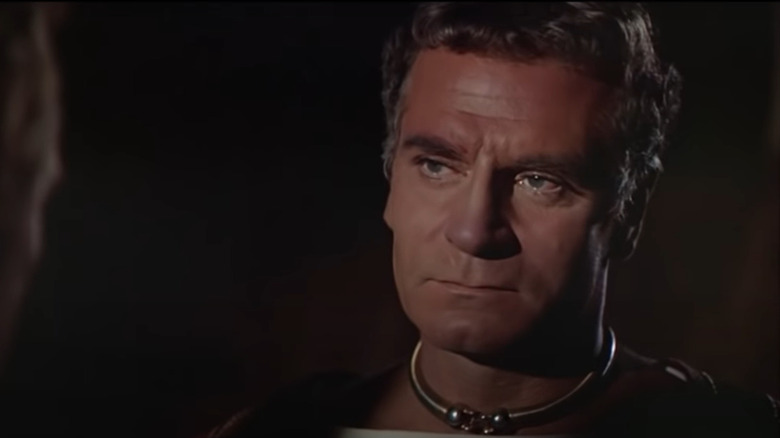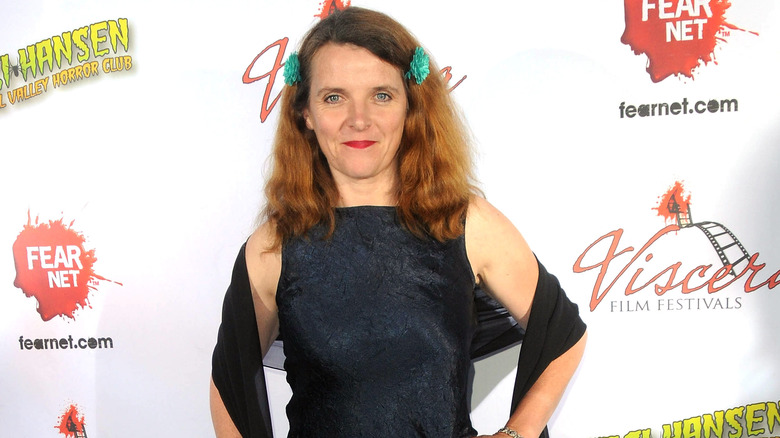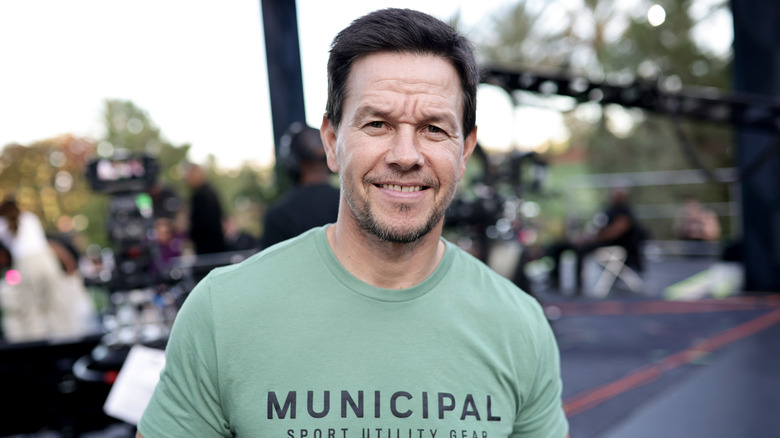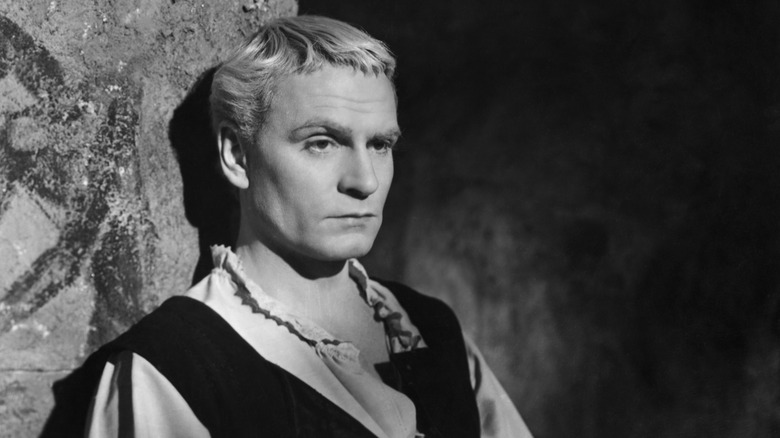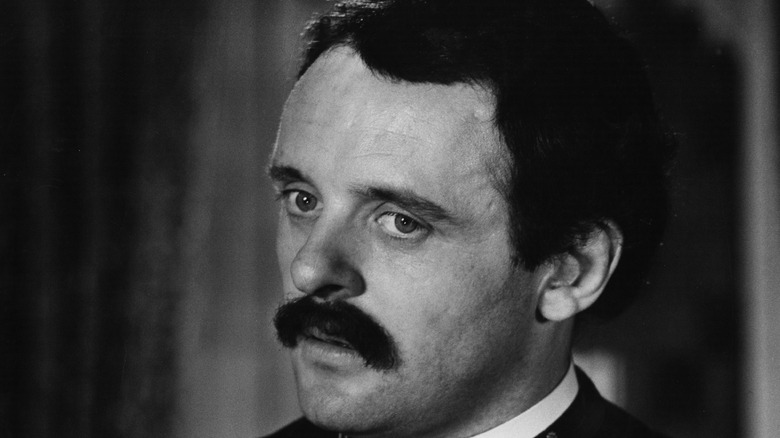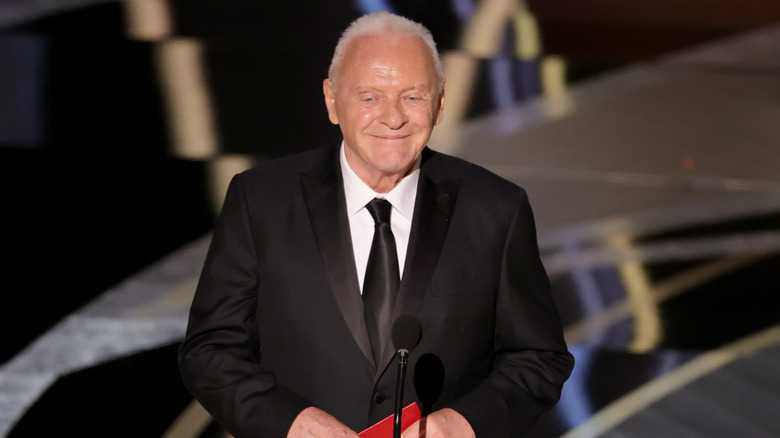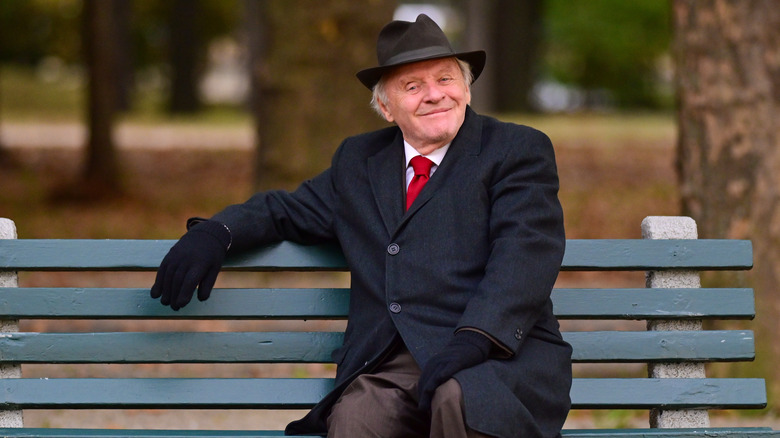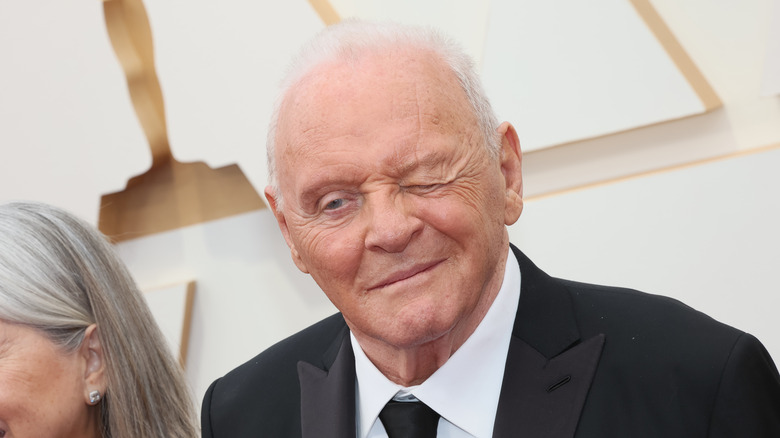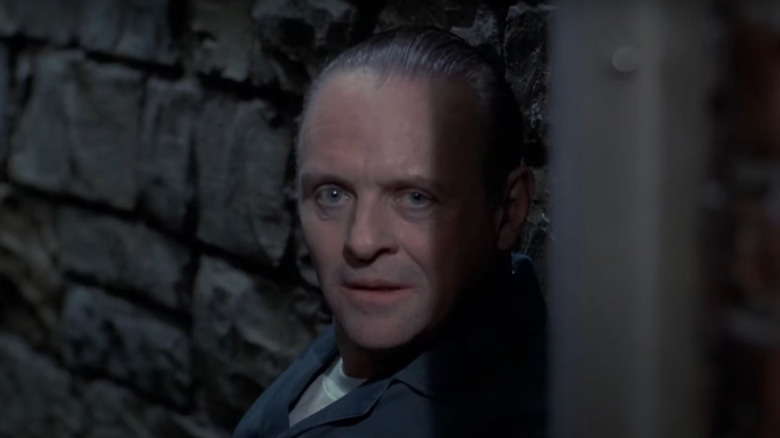What You Never Knew About Anthony Hopkins
He's played some of the most iconic roles in cinematic history, but the iconic actor Anthony Hopkins had a humble upbringing. Born in 1937, Hopkins was raised in Margam, Port Talbot, Wales, and didn't show much talent or ambition for much of his youth. Turning to acting, Hopkins gradually made a name for himself throughout the 1960s and 1970s, and his first big break was sharing the screen with Peter O'Toole and Katharine Hepburn in 1968's "The Lion in Winter."
Ever the workaholic, Hopkins kept himself busy with a constant slate of appearances on the stage, on television, and on the silver screen, and was even in David Lynch's critically acclaimed 1980 film, "The Elephant Man," as Dr. Frederick Treves. However, it was his role in 1991's "The Silence of the Lambs," wherein he played everyone's favorite cannibal, Dr. Hannibal Lecter, that Hopkins was launched into superstardom as one of Hollywood's most talented and recognizable actors.
He's appeared in prestigious dramas and superhero blockbusters and everything in between, but Hopkins is a more complicated person than most fans know. From his earliest aspirations to become a musician to his rediscovery of painting to an estranged daughter he disdains, these are some things you may have never known about Sir Philip Anthony Hopkins.
He started out pursuing music as a young man
While it may be hard to imagine Anthony Hopkins being anything other than an actor, his first creative passion was for the piano. According to NPR, it was Hopkins' mother who pushed him down this initial path when she purchased a used piano; the actor told the outlet that, "She, of course, wanted me to be a concert pianist ... I just wanted to be a composer; I became an actor by default, really. I got a scholarship to a college of music and drama, hoping to take a scholarship in music."
Hopkins still managed to keep his musical talents alive and well ever since those formative lessons at the keyboard as a child. In an interview with Classic FM, Hopkins gave readers an insight into his musical mind, stating that, "Well, I conceive every piece of music in my head away from the piano. I hear the music in my head and slowly it starts developing and taking shape. Most of the music that I am now composing has been inside me for almost 45 years." His talents in film and music have even often crossed over on occasion, such as when he composed the score to the 2007 film, "Slipstream," which he also wrote, directed, and starred in.
The surprising influences behind Hannibal Lecter
Anthony Hopkins' portrayal of the brilliant and cultured psychiatrist Hannibal Lecter, who also happens to eat people, has been terrifying audiences since 1991's "The Silence of the Lambs," setting the bar for silver-screen psychopaths.
To craft such an iconic character, Hopkins drew from a wide range of influences, and one was rumored to be real-life madman Charles Manson, specifically his penchant for staring unblinkingly at those he talked to. The actor told GQ this wasn't the case, but still drew a similarity, saying, "One rule of naturalists when they're confronting the great gorillas is don't look at them. Because that's a threat. So when Lecter doesn't take his eyes off you, that's frightening. And Charles Manson did stare like that. You think that's a disturbed person, because they have no reference point, they have no pity."
But it took more than a manic gaze for Hopkins to bring Lecter to life and realize the sophisticated nature of the fictional cannibal. In an interview with Empire, Hopkins said that, when given the script, the vision of how he should be portrayed instantly came to him: "I knew how he looked and how he sounded. There were two, maybe three voices that I heard. I thought of him as a combination of Katharine Hepburn, Truman Capote and HAL from 2001 [A Space Odyssey]. I don't know why the sound came to my head."
He's the oldest person to win the Oscar for Best Actor in a Leading Role
Anthony Hopkins' resume is filled with seemingly countless award nominations and wins, most notably six Academy Award nominations and two wins, for "The Silence of the Lambs" and, most recently, "The Father." However, it's his second Oscar win that's most interesting; because he won it at the age of 83, it made him the oldest actor to win the Oscar for Best Actor in a Leading Role. Christopher Plummer previously held this record for the Academy Award he won in 2011, for his role in "Beginners." At an age when most people would be well into retirement, Hopkins is starring in prestigious films and garnering massive acclaim from fans and critics.
Hopkins clearly has a problem with taking it easy at his age, and he's the first to admit it. In an interview with AARP, the actor said, "I'm a workaholic. I act. I paint. I play music. I read a lot. It keeps the brain active. I'll go on working until I drop. Stella [Hopkins' wife] is good at keeping me in harness. I spend hours in the studio, painting, and she'll come in and say, 'Enough.' I don't have much common sense."
He's related to an important 20th-century poet
It just so happens that Anthony Hopkins – one of the great figures of the silver screen — is related to one of the great figures of the written word, namely William Butler Yeats. Hopkins' mother was Muriel Yeats, a distant relative to the acclaimed poet.
William Yeats was born in 1865 in Sandymount, Dublin, Ireland. It was during his time at the Metropolitan School of Art in Dublin that his interest in writing emerged, resulting in his first pieces getting published in 1885 in the Dublin University Review. Upon moving to London in 1887 — wherein he became a member of the Theosophical Society — Yeats developed a fascination with mysticism, which would inform his work thereafter. After establishing himself as a poet, he became well known for his plays, like "Four Plays for Dancers" and "At the Hawk's Well." However, his biggest achievement came in 1923 when he won the Nobel Prize for Literature.
It seems that Hopkins comes from a lineage that loves drama. Perhaps as a sneaky tribute to his forebear, in the 1987 film, "84 Charing Cross Road," Hopkins' character actually recites Yeats' poem, "He Wishes For The Cloths Of Heaven."
He almost died shooting one of his movies
Anthony Hopkins has typically appeared in serious dramatic roles, so it was a nice change of pace to see him in a more action-oriented role in 1997's "The Edge." He played a sophisticated businessman who, along with a photographer and his assistant, find themselves trapped in the Alaskan wilderness after their plane crashes, and must deal with a hungry Kodiak bear.
Of course, because the film was actually shot in the wilds of Canada, it proved to be a physically demanding film for Hopkins, who almost died shooting a scene in which he is in an icy river. He was immediately rushed to the hospital for suspected hypothermia and exhaustion, but was able to make a speedy recovery. In fact, the film's spokeswoman told the Independent that it wasn't long before Hopkins had resumed shooting, saying that he's "fit as a fiddle. Quoting Shakespeare, as a matter of fact."
However, there were other health and safety issues the actor had to contend with during the making of "The Edge." For much of the shoot, Hopkins endured considerable pain from a ruptured disc near his neck. Of course, Hopkins is made of sterner stuff, so he used the discomfort to fuel his portrayal of the character, telling the Sun Sentinel, "I was so angry at the pain, at my body being so frail, I think it toughened me, strengthened me and my performance."
He's surprisingly candid about his true feelings on shooting certain movies
Armed with impeccable diction, a powerful presence, and even a knighthood, one expects Anthony Hopkins to conduct himself with a higher level of decorum in his daily life than the average person. And while this may be mostly true, it's nonetheless a bit surprising seeing the famed actor be so candid about his acting career.
Hopkins brought a fair amount of gravity to the role of the Asgardian god Odin in the first three "Thor" films, helping to establish Marvel Studios' movies as more than just sill comic book flicks for kids. However, he didn't think much about his time playing the father of the god of thunder, telling the The New Yorker, "They put me in armor; they shoved a beard on me. Sit on the throne; shout a bit. If you're sitting in front of a green screen, it's pointless acting it."
Hopkins was even more blunt in an interview with US Magazine, where he made a startling admission about why he appeared in more mainstream movies with young Hollywood hunks: "They bring all these little girls in and they get a look at me. I'm very practical about all that. I was asked questions during the junket for 'The Edge,' like, 'What is the arc of the part?' And I'd say, 'I don't know what the f-ck you're talking about.' And they'd say, 'Why did you do it?' And I'd say, 'Because of the money.'"
He's an accomplished painter
Because being an accomplished actor, pianist, and composer wasn't enough, Anthony Hopkins is doing everything he can to establish himself as a modern-day Renaissance man. His paintings are vibrant, even surreal depictions of figures, animals, and landscapes we're all familiar with, portrayed with a surprisingly youthful energy. In fact, it's that innate sense of wonder that fuels his aesthetic work; as Hopkins says on his website, "It's childish art. It has to be childish because I am a child. I've discovered lately that I enjoy all that is supposedly wrong with me. I used to take myself so seriously, but now I don't. I allow myself to revel in the exhilarating nature of life."
Hopkins' initial interest in painting began when he was a teenager, and even showed some promise, but gave it up over the years. However, it was his then-fiance, Stella Arroyave, who convinced him to return to painting in 2003. He told ARTnews that she found some of his old drawings and took a liking to them, recalling, "... she wanted me to do paintings for the wedding guests, about 75 of them. And I said, 'Are you crazy?' But she said, 'Just do it.' So I ended up painting these landscapes and we gave them to the party guests. That's how I started up again."
He lent his voice to a restored version of Spartacus
While legendary director Stanley Kubrick had disowned the film, "Spartacus" is one of the greatest epics of all time. It features an impressive cast — including Kirk Douglas, Laurence Olivier, and Tony Curtis — as well as thrillingly choreographed action scenes that hold up remarkably well today. Of course, like almost all great films, it faced numerous challenges getting made, particularly having several scenes cut out due to content that was considered too violent and sexual in nature.
The American Cinematheque in Los Angeles planned a tribute to Douglas by screening "Spartacus" with some of those scenes reinstated. While the violent scenes were lost, one scene was restored to the film, in which Olivier and Curtis' characters engage in a discussion displaying some veiled homosexuality in the form of a spoken metaphor involving snails and oysters.
Because the original soundtrack couldn't be found, Curtis was called in to re-record his lines, but since Olivier had passed away before the restoration project, Anthony Hopkins was hired to record the lines. He did a fine job, which is understandable, considering he was a protege of Olivier when the late actor was the artistic director at the National Theatre in the 1960s. It was even Olivier's widow, Dame Joan Plowright, who recommended Hopkins for the gig.
He's got an estranged daughter
While off-screen, Anthony Hopkins typically gives an air of kindness and humility, so it might be a little surprising to hear that he has a daughter whom he discusses with disdain.
The daughter in question is Abigail, whom he sired with his first wife, Petronella Barker. When asked if Abigail has any children in an interview with Radio Times (via The Telegraph), Hopkins responded with, "I don't have any idea. People break up. Families split and, you know, 'Get on with your life.' People make choices. I don't care one way or the other." Hopkins regarding his own flesh and blood in such a manner is especially shocking considering he secured her cameos in two of his films, "Shadowlands" and "The Remains of the Day."
However, Hopkins suggested that there's more to the story, that may further explain his chilly relationship with Abigail. In an interview with The London Times, the actor stood by his previous remarks, stating, "Her choice is her choice. You know, I did the best I could, but you know, OK, I think if somebody doesn't want to be part of my life, fine. Go and do whatever you want. I have no memories or any . . . I certainly don't . . . I wish her well and all that, but I don't want to talk about my daughter. Those things are over."
Mark Wahlberg introduced him to social media
Anthony Hopkins has reached a whole new generation of fans on social media, where he posts uplifting videos and messages, often revealing a far more playful side of himself. The actor was even more active during the COVID-19 pandemic, using his various platforms to spread cheer and optimism during such a dark time.
Funnily enough, it was another A-lister who gave him the push to develop an online presence, as he stated in an interview with The New Yorker: "It started with Mark Wahlberg. I was working in Oxford on the Michael Bay film ['Transformers: The Last Knight'], and he said, 'I want you to go on Twitter to tweet.' I didn't know what he was talking about. I'm a bit dopey about that. So I did a message, and that's how it started." Of course, he also got some encouragement from his wife, and that's how Hopkins has become a bit of a social media sensation.
In Hopkins' very first social media post, Wahlberg introduces him to the online world in an adorable video. "I'm with a legend, Sir Anthony Hopkins," Wahlberg says, standing next to the wonderfully childlike Hopkins. "He's joining Twitter today. So, I think you'll probably be the fastest person to 20 million followers. Don't post any nudes."
He was Laurence Olivier's understudy
Anthony Hopkins, one of modern cinema's greatest actors, studied under one of the greatest actors of a previous era: After leaving the Royal Academy in 1963, Hopkins joined the National Theatre, where the legendary Laurence Olivier was the artistic director.
In The New Yorker, Hopkins described himself as "an arrogant and brash young man," who wanted to skip over playing small roles as an extra and jump right into playing meatier parts. The casting director was apparently impressed by the aspiring actor's hunger, and passed his name on to Olivier, who immediately gave him roles in two plays he directed, "Juno and the Paycock," and "Three Sisters," before ultimately bringing Hopkins on as an understudy.
This would soon prove to be a huge break for Hopkins. As Olivier's understudy, he was tasked with learning his part for an upcoming play. "And then one day the stage manager, Diana Boddington, said, 'Sir Laurence is in the hospital. You're going on tonight,'" he told the New Yorker. "I said, 'You're kidding me.' I knew somehow how to do it. I was a good mimic, I guess. They gave me a standing ovation. Four nights we did that, and I thought, How did that happen?" While it wasn't long before Hopkins left the British theatre scene, his time there showed the world that he was more than capable of handling his own among the giants of the dramatic arts.
His struggles in school led to him becoming an actor
Anthony Hopkins wasn't always the overachiever he is renowned for being today. As he revealed to the Daily Mail, Hopkins was a terrible student, saying, "I was pathetic at school in Port Talbot. I don't know if it was dyslexia or Attention Deficit Disorder, or just me being a problem child, but I sat in the back of the classroom and didn't know what any of the teachers were talking about — I was bottom of the class at everything."
On top of that, he was bullied considerably as a young boy. But even then, Hopkins knew that he was meant for more, and used the struggles of his formative years to propel him towards greater aspirations.
The actor revealed in GQ the very moment that he confronted his parents when they expressed their doubt in him: "It was 1955, I always remember, around Easter, and my school reports had been pretty bad ... And I didn't say it in any forceful or bad-tempered way, but I remember saying to him, 'One day I'll show you.' I was standing in the kitchen with my mother and my father and he looked at me and said, 'Well, good. I hope you do.'" Within a few years, he'd be studying acting, and the rest is history.
He believes that Asperger's syndrome helps his acting
Anthony Hopkins was diagnosed with high-end Asperger's syndrome, however, he believes that it gives his acting a competitive edge. He revealed to the Daily Mail how he thinks Asperger's syndrome helps his craft: "I definitely look at people differently. I like to deconstruct, to pull a character apart, to work out what makes them tick and my view will not be the same as everyone else."
The condition is known to affect people's social skills, per the Cleveland Clinic, and while Hopkins admitted that he considers himself a loner, it still hasn't diminished his love of people and his curiosity about what makes them tick. Still, despite being contacted by a doctor about having Asperger's syndrome, Hopkins has some doubts about whether he actually even has it.
As Hopkins told GQ, "I don't, actually, I don't believe in it. I don't feel any different. I think these are dressed up. Maybe I'm wrong. Maybe I'm ignorant. They call it neurodiversity. It's a fancy label. I'm very focused in one way. I notice when I'm in restaurants, but that's my behavior."
He has an incredibly rigorous script-reading process
Anthony Hopkins didn't establish himself as one of the great screen icons simply by looking handsome in front of the camera. No, before the cameras even start rolling, he employs an intense script reading process that has since become something of a legend.
When asked about his fabled practice in Backstage, the actor downplayed this with his usual modesty: "It's a method I use, nothing mysterious about it. I learn the text cold, read it maybe 100 or 200 times. The wagon wheels are little four-pointed asterisks with circles around them, so four of those represent 20 read-throughs, and they make my script look interesting." For Hopkins, it's essential that he understands the script inside and out, as it frees him up to experiment on the set and come up with new variations.
The scribbles and little pictures he draws on his scripts when reading them hundreds of times are a part of his creative process. In fact, the little doodles he creates often grow to encompass much of the page, so much so that his wife Stella took notice of them, which is what prompted her to push him back into painting.
Hopkins believes that acting is easy
Anthony Hopkins has garnered a tremendous amount of success over the decades, but despite the massive amount of work he puts into learning his parts, the actor still considers his craft to be a fairly straightforward one.
Even when starring in a film as heavy as "The Father" — for which he took home his second Oscar — he later told The New York Times, "[Playing the lead character] was easy. Just so easy ... It was an easy part to play, because it was such a good script ... When you watch Olivia and that face crumbles and the tears come out, you think, 'Oh, I don't need to act anymore.'"
For Hopkins, "keep it simple, stupid" is an essential part of his acting philosophy, and one that extends to the overall filmmaking process, too. The actor revealed to AARP, "I'm not big on research. I used to be when I was younger, but now I don't analyze it too much. For me, acting is not hard work. I read a part until I know the text so well that I can be very relaxed. Some people like to do hundreds of takes. I belong to the Clint Eastwood school: Just get on with it."
His Hannibal Lecter character has attracted a large female audience
Anthony Hopkins' most famous role is that of the cannibalistic psychiatrist from the acclaimed 1991 film, "The Silence of the Lambs." The combination of superior intellect with sadistic impulses turned the actor into a household name and won him an Academy Award. However, according to some women, the character exuded a fair amount of sex appeal.
Alison Foreman just happens to count herself among their ranks, as demonstrated in her article for Mashable, wherein she wrote: "Unlike most viewers, I wasn't repulsed or disturbed. My typically shielded eyes were wide open, transfixed on the encounter. I was enthralled, enticed, enchanted. I was, to my considerable surprise, into it. Suddenly, Dr. Hannibal Lecter had become my first real crush. And there was no going back."
An article in The New York Times article relates other stories of women oddly attracted to the actor's portrayal of a doctor, who also likes to eat people. A makeup artist once told Hopkins: "If I had met you after 'Silence of the Lambs,' ooooh!" before pleading with him, "Do those eyes, will you?" It's a request that Hopkins was more than happy to oblige, even going so far as to give her some of the signature slurping sounds.
